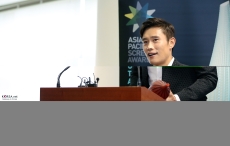The CPD Blog is intended to stimulate dialog among scholars and practitioners from around the world in the public diplomacy sphere. The opinions represented here are the authors' own and do not necessarily reflect CPD's views. For blogger guidelines, click here.

The cultural diplomacy of the Asia Pacific Screen Awards.
The community of nations at the United Nations has said ‘we like Australia’. Australia’s first round win of the temporary United Nations Security Council (UNSC) seat is testament to a strong and effective campaign. Labelled a ‘victory for Australian diplomacy and values’ the UNSC outcome signals a comeback for Australia’s global standing – which has spent a little too many years in the doldrums.
As the countdown to the United Nations Security Council (UNSC) election intensifies, diplomacy takes a silly turn. Australia, Finland and Luxembourg – competitors in the race - continue to outdo each other in pursuit of the diplomatic prize: a temporary seat on the UNSC.
I am optimistic about Australia’s campaign for a temporary seat on the United Nations Security Council (UNSC). To be clear, I am optimistic about the campaign, rather than the contest. It is almost impossible to predict the outcome of the three-way competition between Australia, Finland and Luxembourg for the two available seats; a contest that will be determined by the UN General Assembly (UNGA) in New York on 18 October.
Australia’s international policy portfolio has been left hanging after Foreign Minister Kevin Rudd’s surprise resignation from his post – announced from Mexico in the aftermath of the G20 meeting. Rudd’s resignation, a deliberate retaliation strike against the current Prime Minister Julia Gillard and the ruling Australian Labor Party for the unceremonious leadership coup they pulled off against him some 24 months ago, while fascinating to the political observer, is potentially devastating for Australia’s international image projection.
Australian diplomats and policy-makers were no doubt watching as Australian cyclist, Cadel Evans edged past Luxembourg rival Andy Schlek to win the prestigious Tour de France earlier this week. They may well hope for a repeat performance when Australia faces Finland and Luxembourg next October in the contest for one of the two available seats on the United Nations Security Council (UNSC).
Australia’s Foreign Minister Kevin Rudd is pressing ahead on a high profile public diplomacy campaign to secure support for Australia’s bid to the United Nations Security Council (UNSC) for 2013-14. There is much to be said about the public diplomacy value of political leaders in such campaigns. Kevin Rudd is a case in point. Previously Australia’s Prime Minister, Rudd is already well known and regarded among political and intellectual elite audiences across the globe.
POPULAR ARTICLES
-
June 5
-
June 18
-
June 6
-
June 5
-
May 8
-
June 19
-
May 15
-
June 5
Featured Blogger
Join the Conversation
Interested in contributing to the CPD Blog? We welcome your posts. Read our guidelines and find out how you can submit blogs and photo essays >.








